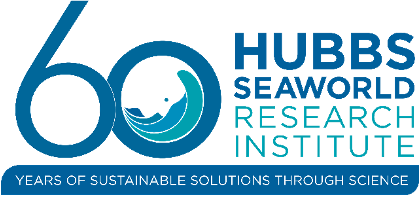Anniversary of Mission-Driven Institute to Culminate with Gala event September 21
In 1963, ZIP codes were introduced, the Beatles released “I Want to Hold Your Hand” and the measles vaccine was approved. Also, one year before the opening of what is now SeaWorld San Diego, one of its founders – Milt Shedd – spearheaded the creation of what is now Hubbs-SeaWorld Research Institute (HSWRI).
Sixty years later, HSWRI remains true to the original vision – “to return to the sea some measure of the benefits derived from it” – having conducted countless studies and published 457 peer-reviewed scientific papers. Central to all its work is the concern about human impacts on marine life and marine environments, and the unwavering quest to find “solutions through science” so that we thrive in harmony.
On September 21, SeaWorld San Diego will host a 60th anniversary gala event to highlight HSWRI’s ground-breaking scientific research, numerous firsts and breakthroughs, and its bright future. Attendees will have behind-the-scenes access to the park and will learn about the latest areas of study from HSWRI scientists.
“Our important work began right away,” explained HSWRI President & CEO Don Kent. “In 1964, we began to tag albacore and bluefin tuna to understand their behaviors. Over ten years, we worked with tuna fishers and collected data that helped them learn how to avoid dolphins.
“Being in the tuna capital of the world at the time,” he continued, “this was a very big deal.”
In the 1970s, HSWRI first recorded the songs of bowhead whales in the wild, one of the world’s longest living mammals.
In the 1980s, HSWRI personnel helped clean sea otters after the Exxon Valdez oil spill, after identifying that dishwashing liquid was the most effective and safest cleaning agent.
In the 1990s, HSWRI helped to kick off the sustainable seafood movement with the opening of the Leon Raymond Hubbard, Jr., Marine Fish Hatchery in Carlsbad, CA.
In the 2000s, HSWRI staff rescued Winter, a bottlenose dolphin whose rescue and rehabilitation became the subject of the movie “Dolphin Tale”.
In the 2010s, HSWRI scientists pioneered the use of drones to survey penguin populations in Antarctica.
In the 2020s, HSWRI’s Florida-based scientists found that bottlenose dolphins begin to establish long-term social ties as calves.
Today, HSWRI continues this legacy, focusing their research on studying marine life and ocean health, sustainable seafood production, and nature-based habitat restoration, addressing challenges like climate change and overfishing. At their core, they use innovative science, education, and strategic partnerships to develop real-world solutions.
Looking at the state of the world and looking ahead, Kent emphasized that sustainability is and always has been at the core of HSWRI’s work.
“We can directly link our efforts to the majority of the United Nations Sustainable Development Goals,” he noted. “These include, but are not limited to, human health and well-being, sustainable economic growth, and the conservation and sustainable use of marine resources.
“Our focus is supporting healthy oceans, upon which all life on Earth depends,” Kent concluded.
Contact: Peter James MacCracken, APR
pjm@strategic-communications.com – (619) 991-1844
About Hubbs-SeaWorld Research Institute (HSWRI)
HSWRI is a not-for-profit, 501(c)(3) research organization founded in 1963 “to return to the sea some measure of the benefits derived from it.” With a long-standing legacy of pioneering marine science that increases understanding of animals and their ecosystems, it enjoys international renown for its work. Its areas of inquiry are ecology, physiology, bioacoustics and aquaculture. Through science, the application of advanced technologies and the expansion of knowledge, the Institute provides effective solutions to conflicts that arise between human activity and the natural world. HSWRI scientists apply sophisticated technologies to seek the solutions that protect and conserve marine animals while benefiting humans and their reliance on marine resources. Based in San Diego with facilities in Melbourne Beach, FL and Carlsbad, CA, HSWRI’s unique contributions are due in part to access to SeaWorld’s extensive marine zoological collection, a close association with local universities and highly respected scientific staff. For more information, visit www.hswri.org.



Recent Comments